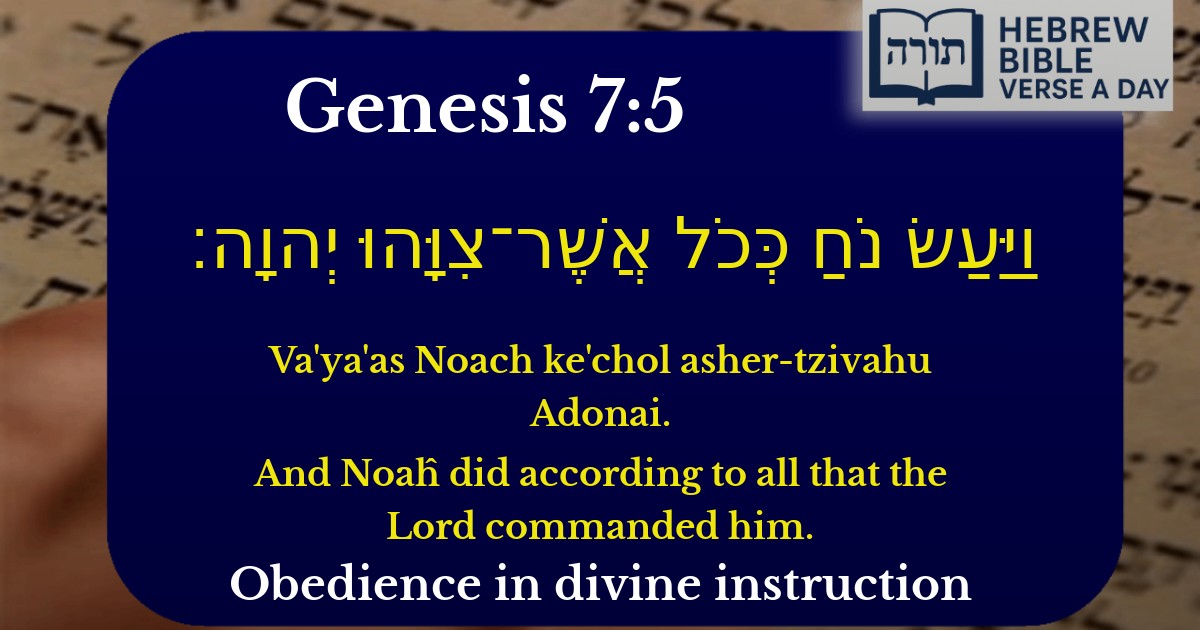Frequently Asked Questions
Q: What does Genesis 7:5 mean when it says Noah did 'all that the Lord commanded him'?
A: This verse teaches that Noah meticulously followed every instruction given by Hashem regarding the building of the ark and gathering the animals. Rashi explains that this emphasizes Noah's complete obedience, even in details that might have seemed unnecessary or difficult.
Q: Why is Noah's obedience in Genesis 7:5 important?
A: Noah's complete obedience serves as a model of faithfulness to Hashem's commandments. The Midrash teaches that Noah's careful fulfillment of every detail demonstrated his righteousness and trust in Hashem, which is why he merited to be saved from the flood.
Q: What can we learn from Noah's actions in Genesis 7:5?
A: We learn the importance of fulfilling mitzvot (commandments) with precision and without compromise. The Rambam teaches that this verse shows we should perform Hashem's will completely, not selectively, just as Noah did with every aspect of building the ark.
Q: How does Genesis 7:5 apply to our lives today?
A: Just as Noah followed all of Hashem's instructions exactly, we too should strive to observe mitzvot carefully and completely. The Talmud (Avodah Zarah 3a) derives from this that we must be scrupulous in both 'major' and 'minor' commandments, as Noah was.
Q: Why does the Torah emphasize that Noah did 'all' that Hashem commanded?
A: The word 'all' teaches that Noah didn't omit or modify any part of Hashem's command. The Sforno explains that this complete compliance was especially significant because Noah fulfilled these unusual commands (building an ark) despite never having seen rain before (as the Midrash states the flood was the first rain on earth).


Noach's Complete Obedience to Hashem's Command
The verse states, "וַיַּעַשׂ נֹחַ כְּכֹל אֲשֶׁר־צִוָּהוּ יְהוָה" ("And Noach did according to all that the Lord commanded him"), emphasizing Noach's unwavering compliance with divine instruction. Rashi (Bereishit 6:22) highlights that this phrase appears twice in the narrative (here and in Bereishit 7:5) to underscore Noach's meticulous fulfillment of Hashem's will—both in building the ark and in entering it.
The Significance of "כְּכֹל" ("According to All")
The term "כְּכֹל" indicates that Noach carried out every detail of the command without deviation. The Rambam (Hilchot Yesodei HaTorah 1:7) teaches that complete adherence to mitzvot reflects true emunah (faith). Noach's actions serve as a model of this principle, as he followed Hashem's instructions precisely, even when they seemed illogical (e.g., building an ark despite no prior experience of rain).
Contrast with Avraham's Later Leadership
Midrash Tanchuma (Noach 5) contrasts Noach's passive obedience with Avraham's proactive righteousness. While Noach fulfilled commands flawlessly, Avraham sought opportunities to serve Hashem beyond explicit directives (e.g., welcoming guests without being commanded). This distinction is why Noach is called "righteous in his generation" (Bereishit 6:9), whereas Avraham is termed "lover of Hashem" (Yeshayahu 41:8).
Lessons in Emunah and Action